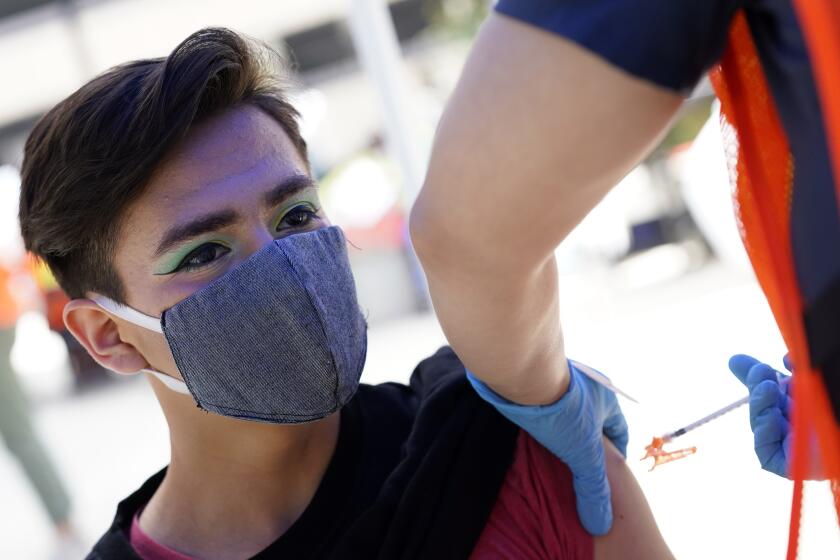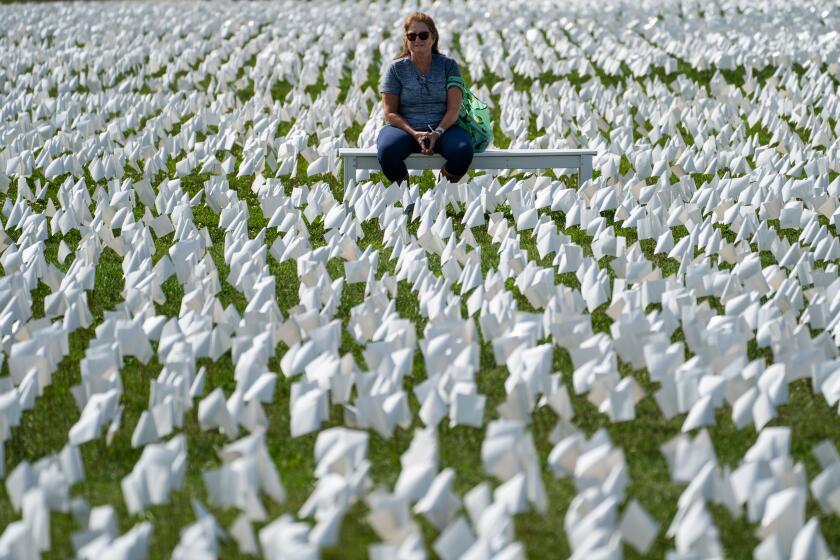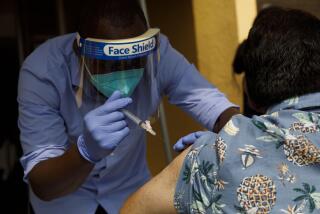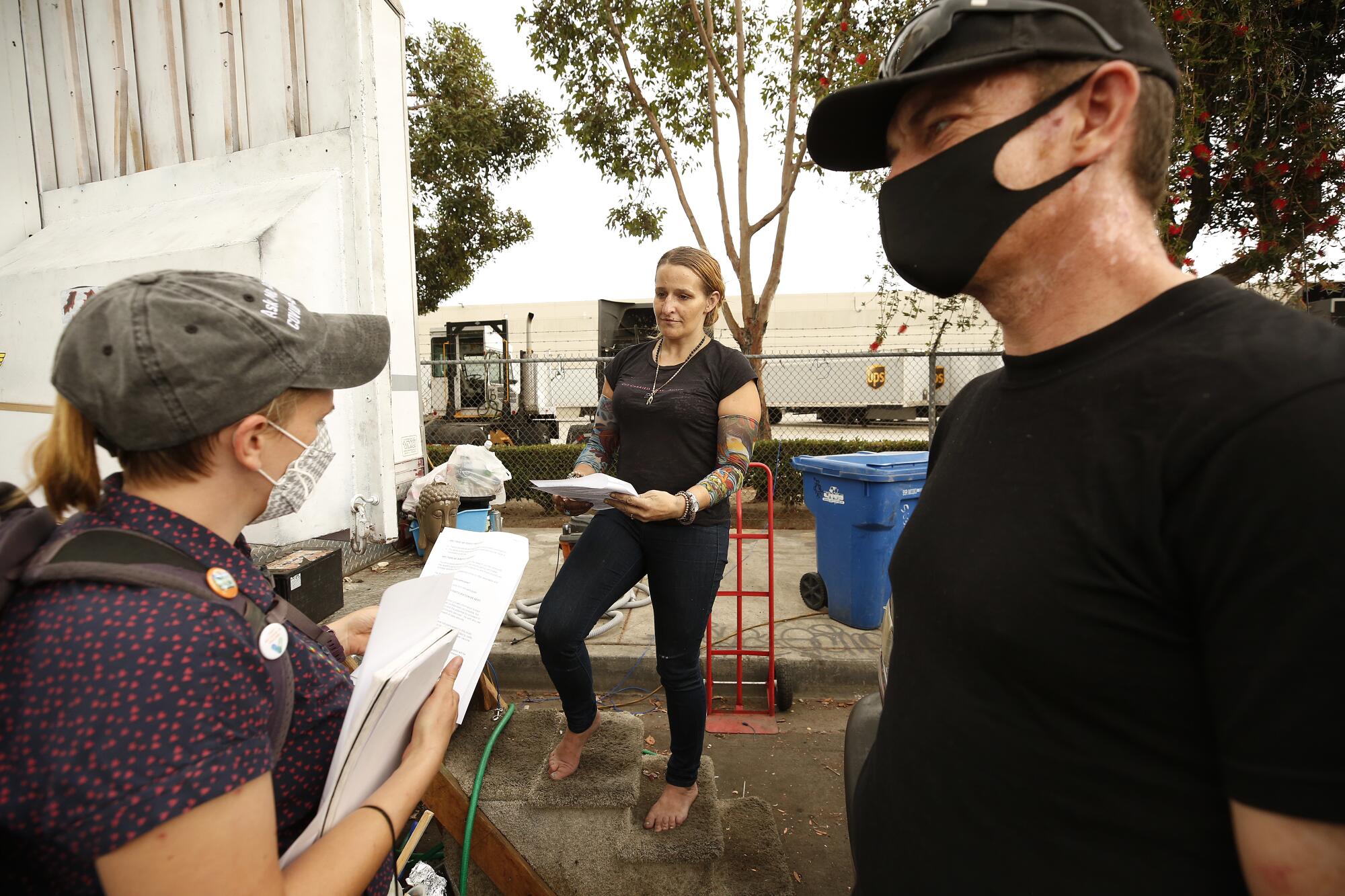
It was a familiar voice that coaxed Kimberly Conti to step out, barefoot, from the back of the hulking former bookmobile parked in an industrial corner of Lincoln Heights.
âHey, whatâs up?â
It was Zack Gustine, who used to park his RV on this same block. âHave you gotten vaccinated already?â he asked her. âDo you want to?â
Conti shrugged. âI donât really care,â she said.
âThatâs how I was too,â Gustine replied. But just a few hours earlier, the 42-year-old had gotten the Johnson & Johnson shot to protect himself against COVID-19. And now he was a âpeer ambassador,â talking to others about the vaccine.
âWe bring it right to you,â he assured her. âItâs super easy.â
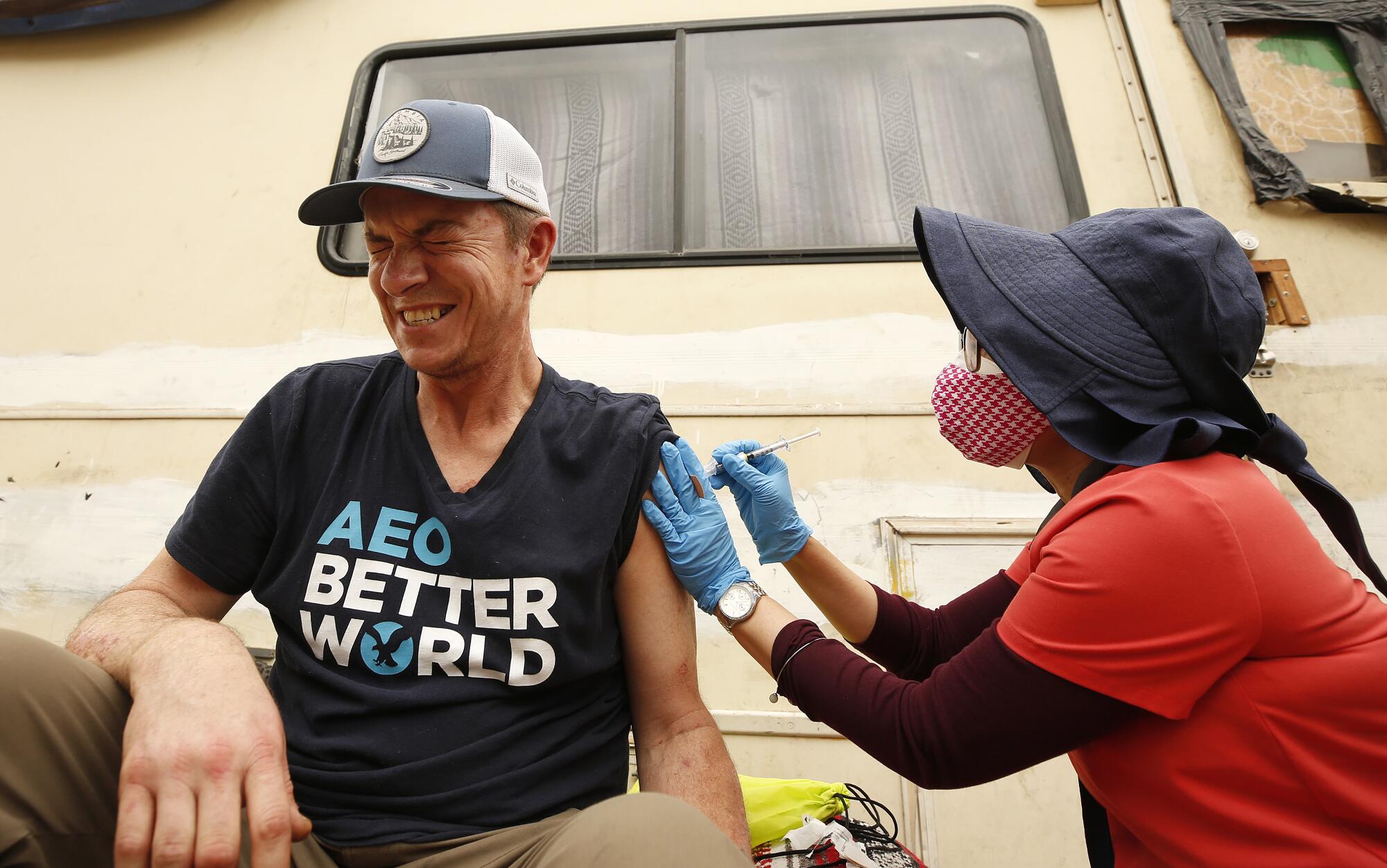
Soon Conti had gotten her shot too â and was joining Gustine and an L.A. County Department of Health Services team as another newly minted ambassador, talking to her neighbors in tents and RVs on the next block.
While not as potent as earlier in the year, COVID-19âs presence looms large, especially heading into the colder fall and winter months.
Itâs a simple and intuitive idea: People tend to listen more to those they know.
So in L.A. County, health officials are enlisting people living in tents, RVs and makeshift shelters to help get unhoused people vaccinated against COVID-19. The fledgling effort, which launched in August, is being funded as a study through the David Geffen School of Medicine at UCLA.
âA lot of people who are experiencing homelessness are not going to look at me or my healthcare colleagues as people who can speak to their experiences,â said Chelsea L. Shover, a UCLA School of Medicine assistant professor and principal investigator for the study. âIt means more to have someone theyâve lived with and spent time with say, âI got mine, and it wasnât a big deal.ââ
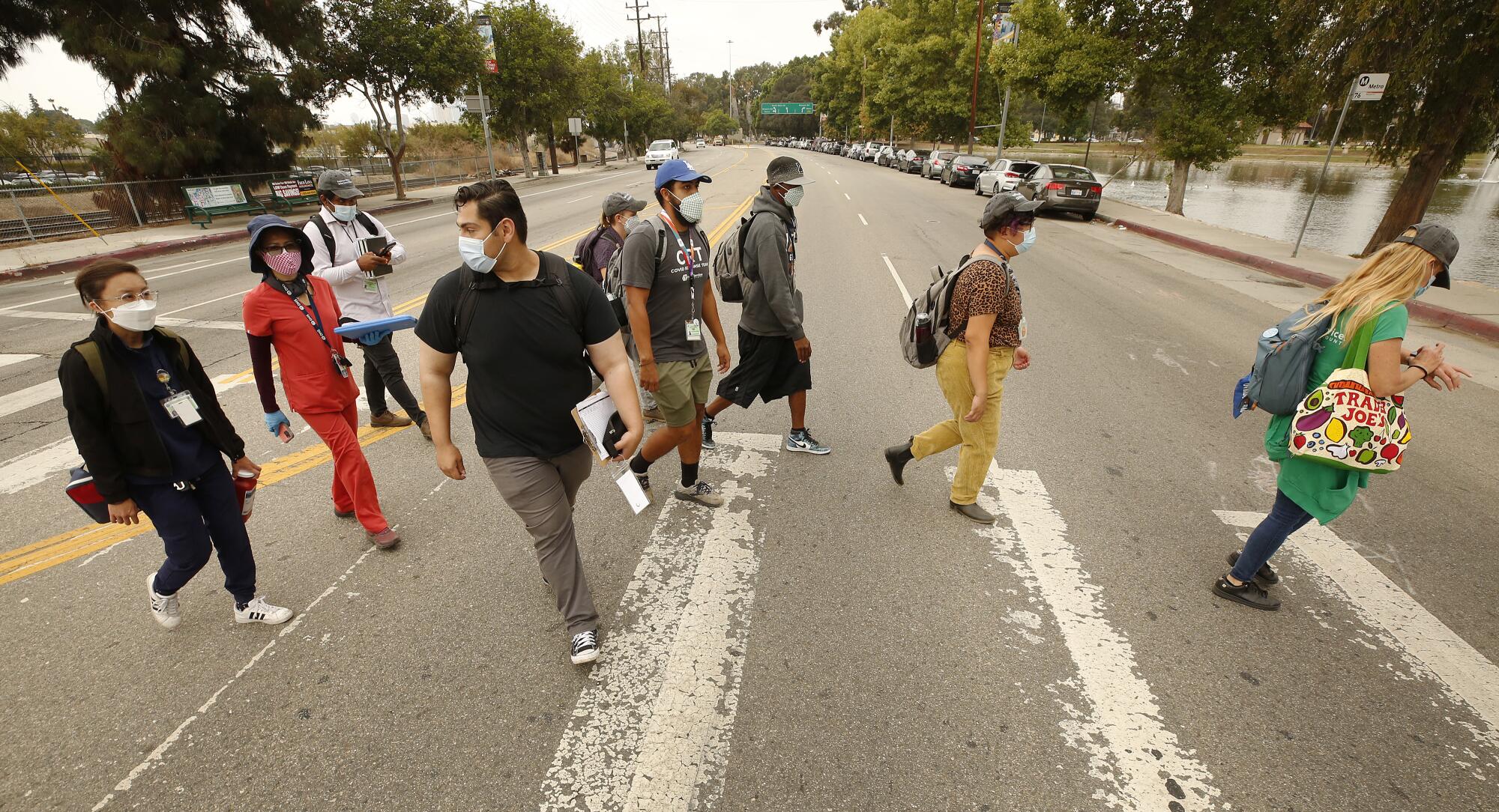
Dozens of people have become peer ambassadors through the demonstration project, which compensates them to do the work for up to eight hours in total, providing $25 gift cards to stores such as Target or Ralphs for each hour worked. To be eligible, they must have a âlived experienceâ of homelessness; most are currently unhoused.
They work side by side with L.A. County Department of Health Services workers, sharing their personal experiences with the vaccine. The teams also hand out snacks, water and other critical supplies, including naloxone kits to treat opioid overdoses. If the people they reach on the streets decide to get vaccinated, a medical team is on hand to provide the shots.
âPeers are able to communicate with their peers and build trust at an exponentially quicker and easier rate than we can,â said JosĂŠ Mata, a senior program manager with the county Housing for Health COVID Response Team. âWeâve seen peers convince people who have told us no â repeatedly.â
In one instance, Mata recalled, his team asked a group of men hanging out in the Lawndale area whether they were vaccinated. The men initially said yes â and his team moved on. He came back shortly to find two of the same men getting their shots, after they had talked to a peer ambassador.
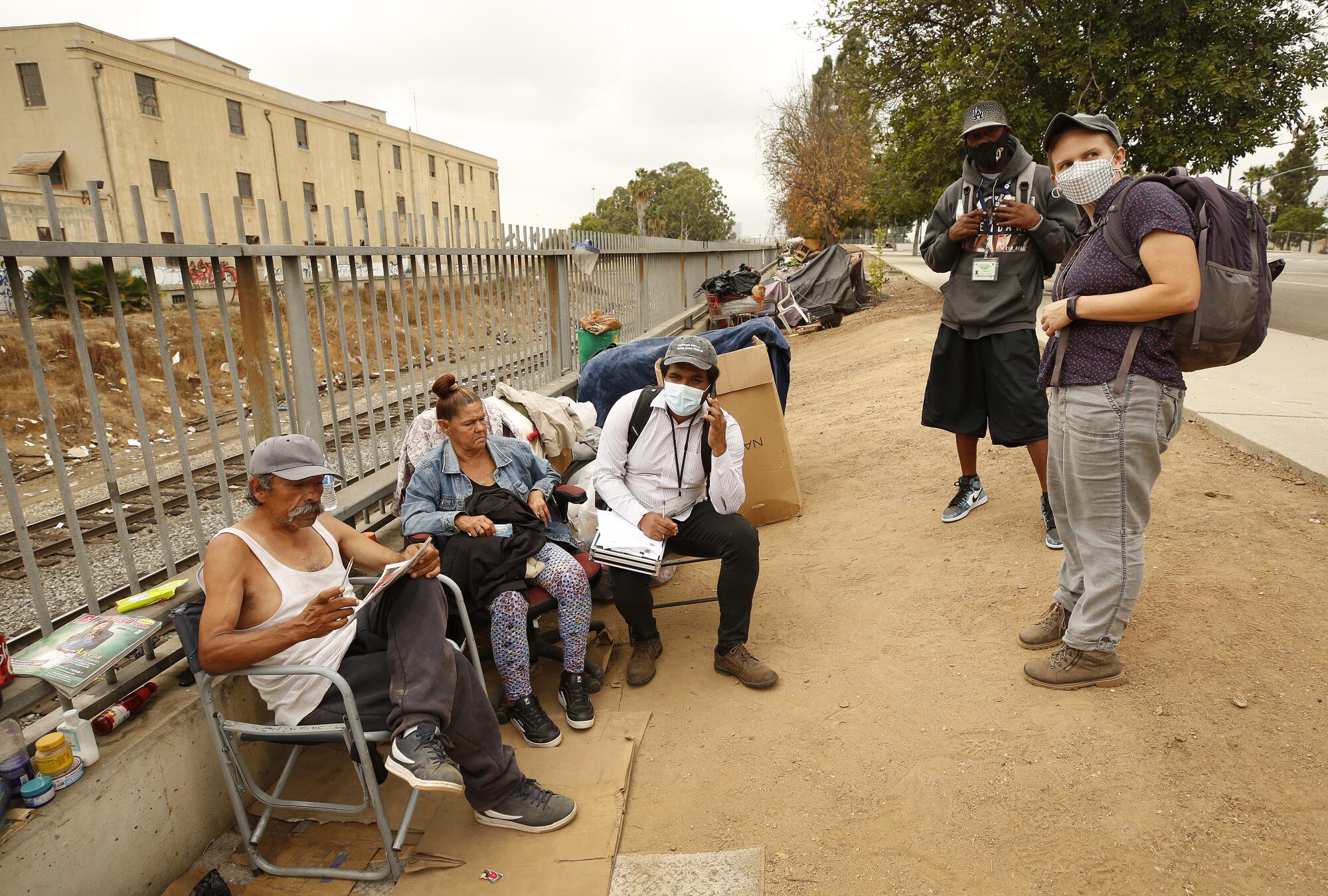
Conti said she was more open to getting vaccinated because a friend was reaching out. âUsually when somebody comes up and talks to me itâs not a good thing â if itâs not somebody I know,â Conti said.
In L.A. County, homeless people have been less likely to get vaccinated against COVID-19 than the general population. As of late September, public health officials estimated that 56.7% of people experiencing homelessness across the county were at least partially vaccinated, compared with nearly 78% of the broader population. More than 200 homeless people have died of COVID-19 across the county, according to the L.A. County Department of Public Health.
Gustine said he hadnât bothered getting the vaccine before because he wasnât especially worried about catching the coronavirus. But when the Department of Health Services team showed up outside his RV, offering to bring him the vaccine, he decided it was âkind of a no-brainer.â
A nurse in tomato-red scrubs crouched next to him on the shoulder of Valley Boulevard and swabbed his upper arm for the shot. Afterward, when he was handed his vaccination card in a plastic sleeve, Gustine joked, âThisâll get me into any club in Hollywood or West Hollywood, right?â
âIâm probably kind of a unicorn here,â he said to the team afterward. âLike how many people do you actually get to take the vaccine?â
âEvery day is different,â said Anthony Coleman, a community health worker who led the team around Lincoln Park, cautioning them to watch for protective dogs outside tents and RVs. âOne day we can get a hundred, next day we might get none.â
Gustine, who has worked as a radio personality, had heard wild theories about the vaccines on the streets: stuff about nanobots, that âthe government somehow can control you.â He was already having trouble swaying others in his RV, who were leery of coming outside.
âAll of the people out here, basically, theyâre scared of any big institutions of any kind,â he said. âYouâre not going to undo a lifetime of that in, like, five minutes.â
Yet Shover has found that many homeless people do want the shots, even if they havenât gotten them yet. In surveys of more than 500 people living without shelter in L.A. County in May and June, 36% said they were already vaccinated, 30% said they didnât want the shots, and 34% said they wanted to get the vaccine.
And in some cases, Shover said, âa ânoâ today is really a ânot yet.ââ Out of those who declined, more than half answered ânot yetâ or ânot todayâ instead of ânever.â
One couple, seated side by side on chairs overlooking the train tracks, said they had tried to get the shots when the L.A. Fire Department was giving them across the street in Lincoln Park. âThey said we had to do it online and all that,â Denise Lerma, 54, recalled.
Statewide numbers of new coronavirus infections and COVID-19 hospitalizations have been falling for weeks, but daily death counts have remained high.
âI said, âBut weâre right here!ââ said Paul Carrera, 62, who had been with Lerma for a dozen years.
Lerma had ultimately gotten her first dose of the Moderna vaccine â she believed it happened when she was in a convalescent home â but still needed her second. Carrera didnât have one at all. A nurse ferried the shots over to them.
At a tent draped in gray and blue tarps, Gustine stopped by to see a friend. âYou havenât had the vaccination yet?â he asked the woman.
Gustine let her know they had snacks and other things to give out â and added that if she got vaccinated, there would be a gift card too. (The county Housing for Health program relies on private funders, including the United Way, to pay for cards as an incentive for homeless people to get vaccinated. UCLA provides additional gift cards to compensate the ambassadors.) Gustine told the woman he had gotten the vaccine just a couple of hours ago.
âI wasnât even really planning on getting it,â he said. âBut these guys came, I did it, and itâs fine.â
The woman decided to go for it. As they waited for the medical team to come over, they gabbed about things on the block, who had moved where. Soon the woman began calling to others along the street, âHey, you want to get a shot?â
Others on the block remained leery. At one point, Gustine said he was a little surprised that more people werenât swayed to get vaccinated when he recommended it.
A Department of Health Services staffer reassured him it was âlike 10 times what we normally get here.â Four people on the block had opted to get vaccinated that day after Gustine approached them, in addition to the four â including Gustine â who had gotten vaccinated in and around Lincoln Park.
Shover said one of the big benefits of bringing on peer ambassadors is that they can say things to their friends and neighbors that wouldnât fly from health workers. She recounted a peer ambassador telling a friend, âGet out of my tent. Donât come back until you get vaccinated!â
That kind of candid talk is already happening on the streets, Shover added. She pointed to a viral video, shot on Hollywood Boulevard by local activist William Gude, in which a vaccination opponent with a megaphone on Hollywood Boulevard demanded to know why the homeless people around them werenât dead of COVID-19.
âBecause Iâm vaccinated,â a man pushing a shopping cart shot back, punctuating the comeback with a profanity.
Shover already knew the man, named Ray, who had gotten vaccinated through a Department of Health Services pop-up clinic. She reconnected with him, helped get him a phone and gave him one of their caps, which reads âASK ME ABOUT THE COVID-19 VACCINE.â An online fundraiser, set up by Gude and an assistant, has since raised more than $30,000 to help him.
âPeople are already doing vaccine education!â Shover said. âSo we might as well pay them for it.â
More to Read
Sign up for Essential California
The most important California stories and recommendations in your inbox every morning.
You may occasionally receive promotional content from the Los Angeles Times.
